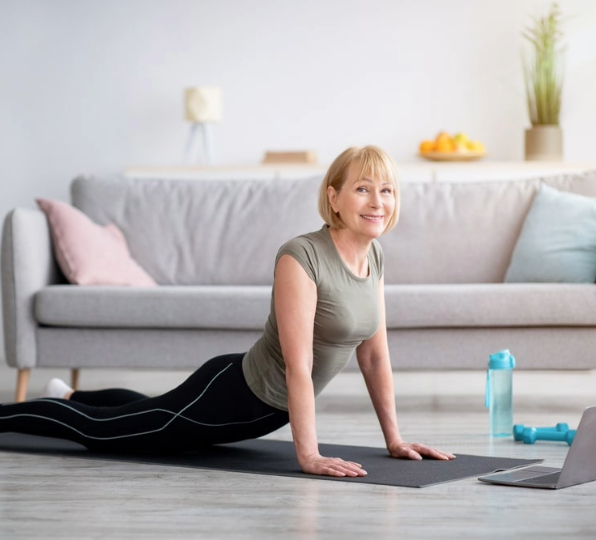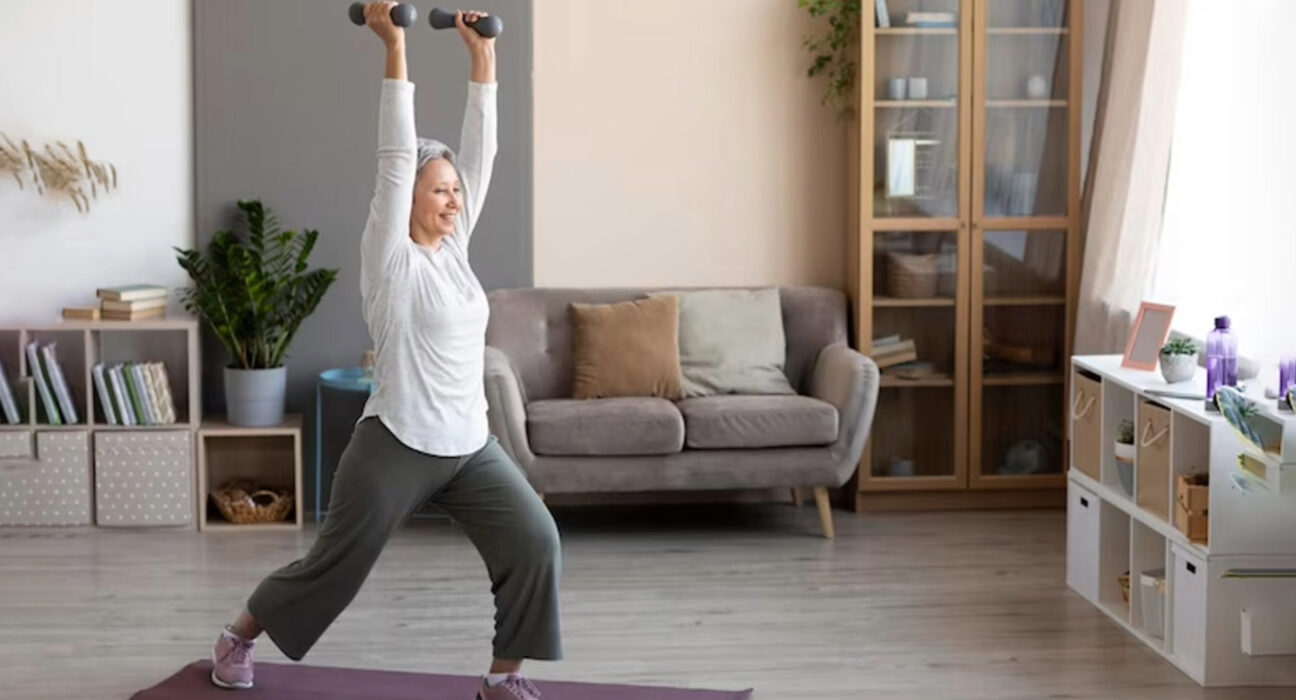Introduction:
The thought of fitting in a consistent exercise regimen can be intimidating in a world where time seems to elude us like sand. However, what if I told you that you might be able to extend your life by years with just 11 minutes a day? A startling new finding from a recent study is that even a small amount of daily exercise can considerably lower the chance of dying young. Let’s examine this ground-breaking research and discover how adding even a brief daily activity burst may hold the secret to living a longer, healthier life.
1. The Study
The study under review explores the impact of a brief, yet consistent, exercise regimen on overall health and well-being. The methodology employed in the study was straightforward: participants were asked to engage in just 11 minutes of exercise each day. This exercise routine focused on high-intensity interval training (HIIT), a form of exercise characterized by short bursts of intense activity followed by brief rest periods.
Researchers gathered data from a diverse group of participants over a specified period to assess the effects of this minimal exercise regimen. The findings revealed remarkable outcomes, underscoring the potential benefits of even a brief daily exercise commitment.
Despite the brevity of the exercise routine, participants experienced notable improvements in various health parameters. Both physical and mental well-being showed significant enhancements, with participants reporting increased energy levels, improved mood, and reduced stress levels. Moreover, participants exhibited improvements in cardiovascular health markers, including reduced blood pressure and cholesterol levels.
One of the most striking aspects of the study was the simplicity and accessibility of the exercise regimen. Just 11 minutes a day proved sufficient to yield tangible benefits, debunking the notion that prolonged, arduous workouts are necessary for significant health improvements. This finding is particularly noteworthy in today’s fast-paced world, where time constraints often deter individuals from engaging in regular exercise.
The study’s statistics further underscored the efficacy of the brief exercise regimen. Participants demonstrated measurable improvements in key health metrics, with statistically significant reductions in markers of cardiovascular risk. Additionally, subjective assessments of well-being, such as self-reported mood and energy levels, showed substantial improvements across the board.
These findings hold profound implications for public health initiatives and individual wellness strategies. The study suggests that even individuals with busy schedules can reap substantial benefits from incorporating short, intense bouts of exercise into their daily routines. Furthermore, the simplicity and accessibility of the prescribed exercise regimen make it an attractive option for individuals of all fitness levels and backgrounds.
2. Understanding the Impact
Even brief periods of exercise can have profound effects on overall health, demonstrating that small actions can yield significant benefits. Despite the common belief that exercise requires lengthy and strenuous workouts to be effective, research increasingly suggests otherwise. Short bursts of physical activity, even as brief as a few minutes, can positively impact various aspects of health and contribute to longevity.
Exercise influences longevity through multiple mechanisms, each playing a crucial role in promoting overall well-being. First and foremost, regular physical activity improves cardiovascular health by strengthening the heart muscle, enhancing circulation, and lowering blood pressure and cholesterol levels. These effects reduce the risk of heart disease, the leading cause of mortality worldwide.
Additionally, exercise boosts metabolism, helping the body efficiently utilize energy and maintain a healthy weight. By increasing muscle mass and improving insulin sensitivity, physical activity supports metabolic health and reduces the risk of obesity and type 2 diabetes, both of which are significant contributors to chronic disease and premature mortality.
Furthermore, exercise exerts anti-inflammatory effects, reducing systemic inflammation and mitigating the risk of various inflammatory conditions. Chronic inflammation is implicated in the pathogenesis of numerous diseases, including cardiovascular disease, cancer, and neurodegenerative disorders. Regular physical activity helps modulate the inflammatory response, promoting a healthier internal environment and enhancing longevity.
Addressing common misconceptions about exercise duration and intensity is essential to encourage individuals to prioritize physical activity in their daily lives. Many people believe that exercise must be prolonged and strenuous to be beneficial, leading them to forgo activity altogether if they cannot commit to extended workouts. However, research suggests that even short bouts of activity, such as brisk walking or cycling, can yield meaningful health improvements.
Moreover, accumulating evidence supports the concept of “exercise snacking,” which involves incorporating brief periods of activity throughout the day. These short bursts of movement, such as taking the stairs instead of the elevator or doing a few minutes of bodyweight exercises during breaks, can add up to significant cumulative benefits over time. By dispelling the myth that exercise must be time-consuming and arduous, individuals are empowered to adopt more active lifestyles and reap the rewards of improved health and longevity.
3.Practical Applications
Incorporating short bursts of exercise into daily life doesn’t have to be daunting or time-consuming. With some creativity and commitment, it’s possible to reap the benefits of physical activity without disrupting your busy schedule. Here are some practical tips for incorporating short bursts of exercise into your daily routine:
- Brisk Walks: Take advantage of opportunities to walk briskly throughout the day. Whether it’s walking to work, taking the stairs instead of the elevator, or going for a stroll during your lunch break, aim to accumulate at least 30 minutes of brisk walking each day. This low-impact activity is accessible to people of all fitness levels and can be easily integrated into your daily commute or routine.
- Quick Bodyweight Exercises: Incorporate quick bodyweight exercises into your daily routine to build strength and improve cardiovascular health. Exercises like squats, lunges, push-ups, and planks can be done virtually anywhere, requiring minimal equipment and time. Dedicate a few minutes in the morning or evening to perform a series of bodyweight exercises, focusing on form and proper technique.
- High-Intensity Interval Training (HIIT): HIIT workouts are a time-efficient way to boost metabolism, burn calories, and improve cardiovascular fitness. These workouts involve alternating between short bursts of intense exercise and brief rest periods. You can perform HIIT exercises using simple movements like jumping jacks, burpees, mountain climbers, or high knees. Aim for 15-20 minutes of HIIT training, incorporating exercises that target different muscle groups for a comprehensive workout.
- Incorporate Movement Breaks: Break up long periods of sitting or sedentary activity with short movement breaks throughout the day. Set a timer to remind yourself to stand up, stretch, and move around every hour. You can perform simple stretches, walk around the office or your home, or do a quick set of jumping jacks to increase blood flow and energy levels.
- Make it Fun and Varied: Keep your workouts enjoyable and engaging by mixing up your activities and trying new exercises. Consider joining a fitness class, playing a sport with friends, or exploring outdoor activities like hiking, biking, or swimming. The key is to find activities that you enjoy and look forward to, making it easier to stay motivated and consistent.
- Set Realistic Goals: Start with realistic and achievable goals that align with your fitness level and schedule. Focus on consistency rather than intensity, aiming to incorporate short bursts of exercise into your daily routine consistently. Celebrate small victories along the way and adjust your goals as you progress.
4.Overcoming Barriers
Adopting a regular exercise routine can be challenging, especially when faced with common barriers such as lack of time, motivation, or resources. However, with the right strategies and mindset, it’s possible to overcome these obstacles and prioritize physical activity in your daily life.
- Lack of Time: Many people cite lack of time as the primary barrier to exercise. Between work, family responsibilities, and other commitments, finding time to squeeze in a workout can seem impossible. However, even short bursts of exercise can add up over the course of the day. Look for opportunities to incorporate movement into your daily routine, such as taking the stairs instead of the elevator, walking or biking to work, or doing quick bodyweight exercises during breaks.
- Lack of Motivation: Staying motivated to exercise can be challenging, especially when faced with competing demands and distractions. To overcome this barrier, set realistic and achievable goals that align with your interests and priorities. Find activities that you enjoy and look forward to, whether it’s dancing, hiking, or playing sports with friends. Additionally, enlist the support of friends, family members, or a workout buddy to help keep you accountable and motivated.
- Lack of Resources: Limited access to fitness facilities or equipment can hinder individuals from engaging in regular exercise. However, there are plenty of ways to stay active without fancy gym memberships or expensive equipment. Explore free or low-cost options in your community, such as outdoor parks, walking trails, or community centers that offer fitness classes. You can also find a wealth of workout videos and resources online that require minimal or no equipment.
- Overcoming Mental Barriers: Sometimes, the biggest barriers to exercise are mental rather than physical. Negative self-talk, fear of failure, or past experiences of discomfort during exercise can all undermine motivation and confidence. To overcome these mental barriers, practice self-compassion and focus on the positive benefits of exercise, such as improved mood, energy, and overall well-being. Break tasks into smaller, more manageable steps, and celebrate your progress along the way.
- Emphasize Consistency Over Perfection: Remember that every step counts towards a healthier future, and even small changes can yield significant benefits over time. Instead of striving for perfection or unrealistic goals, focus on consistency and making sustainable lifestyle changes. Celebrate your successes, no matter how small, and be kind to yourself on days when things don’t go as planned.


Conclusion:
The findings of this study underscore the profound impact that even a minimal amount of exercise can have on our health and longevity. By committing just 11 minutes each day to physical activity, individuals can significantly reduce their risk of early death and enjoy a multitude of other health benefits. So, seize the opportunity to prioritize your well-being, and let the power of 11 minutes transform your life for the better.












